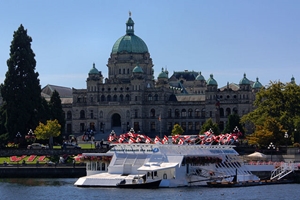October 12, 2016 •
Fall Legislative Assembly Session Cancelled in British Columbia
The provincial government cancelled the fall 2016 legislative session on the day it was scheduled to begin. Another session is not intended until February ahead of the May 9, 2017, general election. The Official Opposition is calling for the Legislature […]
 The provincial government cancelled the fall 2016 legislative session on the day it was scheduled to begin. Another session is not intended until February ahead of the May 9, 2017, general election.
The provincial government cancelled the fall 2016 legislative session on the day it was scheduled to begin. Another session is not intended until February ahead of the May 9, 2017, general election.
The Official Opposition is calling for the Legislature to meet in October to introduce the 2017 provincial budget and to address funding to remedy the current housing crisis and loopholes in the province’s rent control laws.
This is the third time in five years the fall session has been cancelled.
Photo of the main block of the British Columbia Parliament Buildings by Ryan Bushby on Wikimedia Commons.
May 20, 2016 •
Legislative Assembly of British Columbia Adjourned
On May 19, the fifth session of the 40th parliament of the Legislative Assembly of British Columbia adjourned. The Local Elections Campaign Financing (Election Expenses) Amendment Act, 2016, also received royal assent on May 19. Member Bills 213, 219, and […]
 On May 19, the fifth session of the 40th parliament of the Legislative Assembly of British Columbia adjourned. The Local Elections Campaign Financing (Election Expenses) Amendment Act, 2016, also received royal assent on May 19. Member Bills 213, 219, and 229, which also dealt with campaign finance, did not progress pass the first reading stage.
On May 19, the fifth session of the 40th parliament of the Legislative Assembly of British Columbia adjourned. The Local Elections Campaign Financing (Election Expenses) Amendment Act, 2016, also received royal assent on May 19. Member Bills 213, 219, and 229, which also dealt with campaign finance, did not progress pass the first reading stage.
The Legislature is scheduled to convene again this year on October 3.
December 2, 2014 •
Legislature of British Columbia Adjourns
On November 27, the third session of the 40th parliament of the British Columbia Legislative Assembly adjourned for the year. The Legislature did not pass Bill M202, the Election Finance Amendment Act. It would have restricted political contributions to donations […]
 On November 27, the third session of the 40th parliament of the British Columbia Legislative Assembly adjourned for the year. The Legislature did not pass Bill M202, the Election Finance Amendment Act. It would have restricted political contributions to donations made by individual residents of the province and eliminated corporate, union, and out-of-province donations.
On November 27, the third session of the 40th parliament of the British Columbia Legislative Assembly adjourned for the year. The Legislature did not pass Bill M202, the Election Finance Amendment Act. It would have restricted political contributions to donations made by individual residents of the province and eliminated corporate, union, and out-of-province donations.
Photo of the main block of the British Columbia Parliament Buildings by Ryan Bushby on Wikimedia Commons.
May 7, 2014 •
Bills Concerning Campaign Finances for Local Elections Pass British Columbia Legislative Assembly
Two campaign finance bills affecting local elections in British Columbia were passed last week by the Legislative Assembly. On May 1, Bill No. 20, the Local Elections Campaign Financing Act, and Bill No. 21, Local Elections Statutes Amendment Act, 2014, […]

Two campaign finance bills affecting local elections in British Columbia were passed last week by the Legislative Assembly.
On May 1, Bill No. 20, the Local Elections Campaign Financing Act, and Bill No. 21, Local Elections Statutes Amendment Act, 2014, were passed after the third readings. The new laws will require, among other changes, third party advertising sponsors to register with Election B.C., report expenditures and contributions of $50 or more, and clearly identify themselves in any election advertisement.
The legislation will become effective after royal assent.
Photo of the British Columbia Legislative Assembly building courtesy of KirinX on Wikimedia Commons.
August 22, 2013 •
Changes Coming to Local Elections in British Columbia
November 2014 Elections
 On August 21, 2013, the British Columbia Ministry of Community, Sport and Cultural Development announced the province will be making changes to the rules regarding local government elections starting in 2014. The rules apply to candidates, elector organizations, and third party advertisers in elections held for municipalities, regional districts, parks boards, the Islands Trust, and boards of education.
On August 21, 2013, the British Columbia Ministry of Community, Sport and Cultural Development announced the province will be making changes to the rules regarding local government elections starting in 2014. The rules apply to candidates, elector organizations, and third party advertisers in elections held for municipalities, regional districts, parks boards, the Islands Trust, and boards of education.
According to the press release, this new set of laws include requiring disclosure and registration by third-party advertisers, requiring sponsorship information be displayed on all election advertising, requiring all campaign finance disclosure statements to be filed 90 days after the election, and banning anonymous contributions. Additional changes will allow Elections BC to play a greater role in the enforcement of campaign finance rules in local elections.
The changes are based upon the recommendations of the joint Provincial and Union of BC Municipalities Local Government Elections Task Force.
In September a white paper outlining the government’s intention will be released. Public comment on the white paper will be open until October 23. Once consolidated, the rules for the November 2014 local elections will be introduced as a new campaign finance act in the spring of 2014.
Consultation with key stakeholders will begin in November to consider further legislative changes for the 2017 elections.
Coralee Oakes, Minister of Community, Sport and Cultural Development, states in the press release, “These changes are about enhancing transparency and accountability.”
60 days
 A court in British Columbia has ruled the province cannot restrict election spending in the 60 days leading up to an official election call.
A court in British Columbia has ruled the province cannot restrict election spending in the 60 days leading up to an official election call.
In British Columbia Teachers’ Federation v. British Columbia (Attorney General), the British Columbia Court of Appeal panel upheld a lower court ruling finding portions of Election Act sections 235.1 and 228 are unconstitutional, and are of no force and effect insofar as they relate to the pre-campaign period as defined in the Act. Therefore, the court affirmed the British Columbia Attorney General cannot restrict election spending in the pre-campaign period 60 days before the election period begins.
Election advertising preceding a 28-day campaign period is considered a “pre-campaign” period. In the decision Justice Catherine Anne Ryan wrote, “[R]estricting third-party advertising during the pre-campaign period would unjustifiably interfere with third parties’ issue advocacy, lobbying activity, and other advertising endeavours unrelated to the election.”
State and Federal Communications, Inc. provides research and consulting services for government relations professionals on lobbying laws, procurement lobbying laws, political contribution laws in the United States and Canada. Learn more by visiting stateandfed.com.

